Family Law Assignment: Case Studies on Divorce and Relevant Laws
VerifiedAdded on 2023/05/30
|8
|2462
|278
Homework Assignment
AI Summary
This document presents two family law assignments focused on divorce cases. The first assignment analyzes a scenario where a party seeks a divorce, examining grounds such as adultery, unreasonable behavior, and desertion, and determining if the divorce can be granted based on the presented facts. It explores relevant laws, the concept of irretrievable breakdown, and whether the petitioner's actions contributed to the respondent's mental health issues. The second assignment investigates a case where a party seeks divorce due to the other party's unreasonable behavior, including making jokes, refusing chores, and changing locks. The analysis focuses on whether the petitioner can proceed with the divorce, the applicable laws, and the specific behaviors that constitute unreasonable behavior. Both assignments provide detailed legal analysis and conclusions based on the provided facts and relevant legislation.
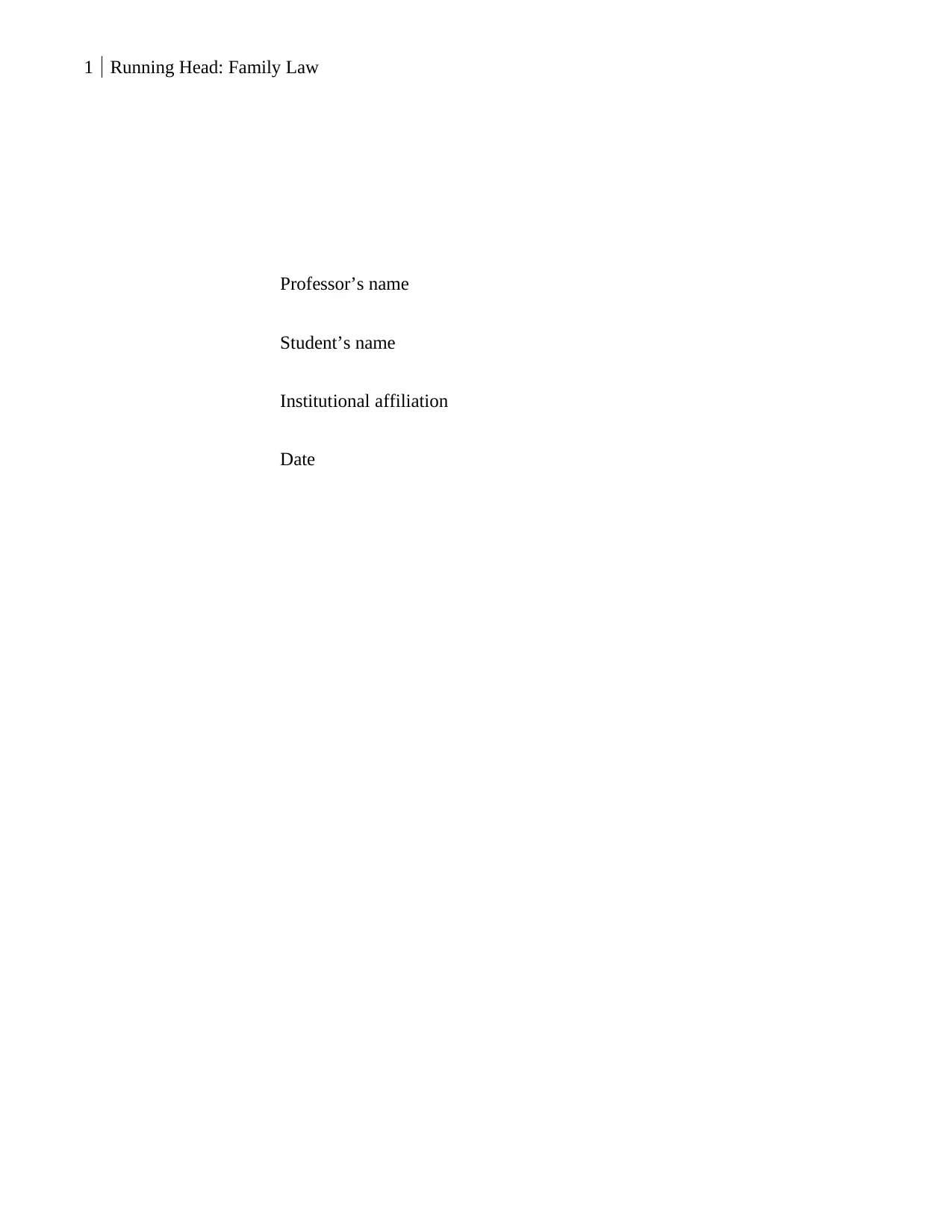
1 Running Head: Family Law
Professor’s name
Student’s name
Institutional affiliation
Date
Professor’s name
Student’s name
Institutional affiliation
Date
Paraphrase This Document
Need a fresh take? Get an instant paraphrase of this document with our AI Paraphraser
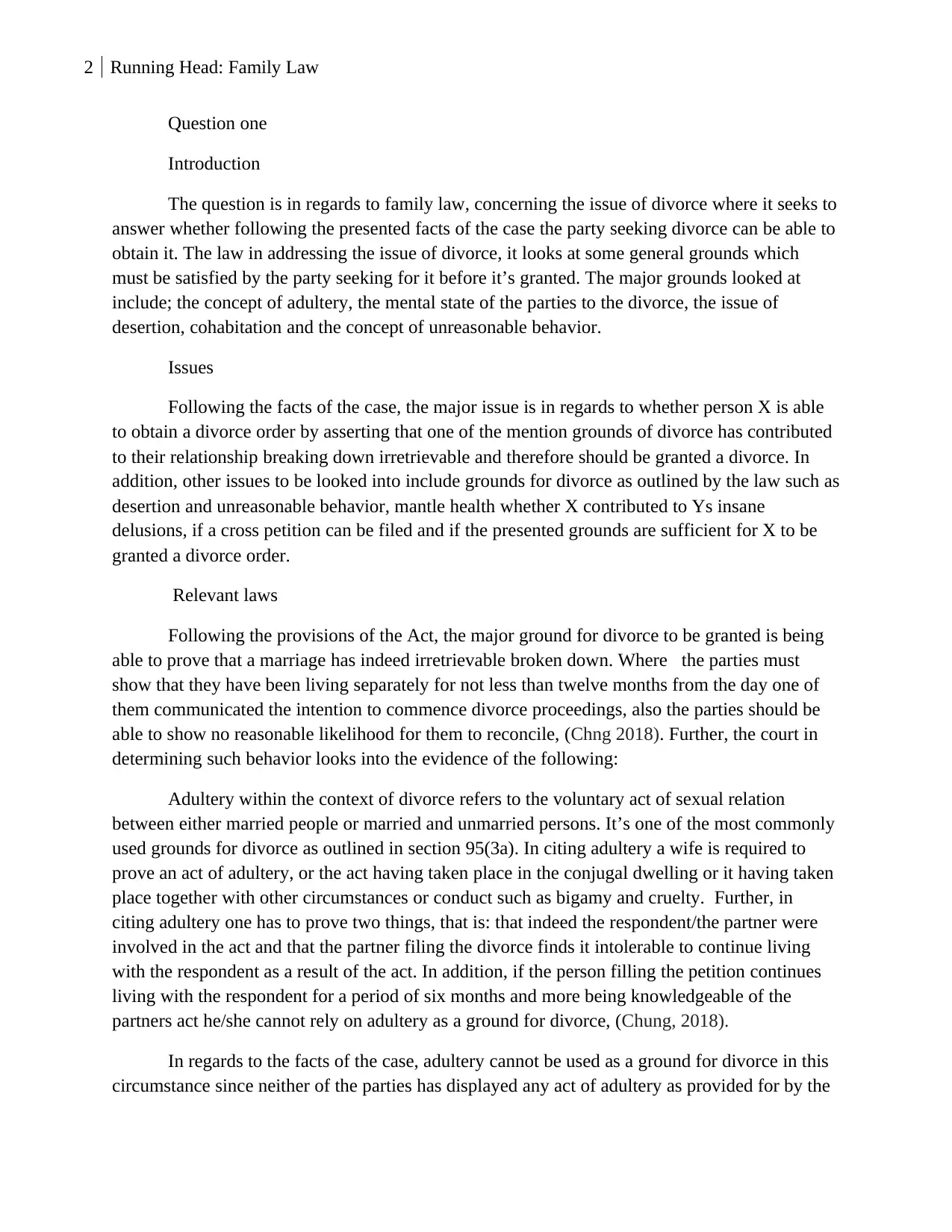
2 Running Head: Family Law
Question one
Introduction
The question is in regards to family law, concerning the issue of divorce where it seeks to
answer whether following the presented facts of the case the party seeking divorce can be able to
obtain it. The law in addressing the issue of divorce, it looks at some general grounds which
must be satisfied by the party seeking for it before it’s granted. The major grounds looked at
include; the concept of adultery, the mental state of the parties to the divorce, the issue of
desertion, cohabitation and the concept of unreasonable behavior.
Issues
Following the facts of the case, the major issue is in regards to whether person X is able
to obtain a divorce order by asserting that one of the mention grounds of divorce has contributed
to their relationship breaking down irretrievable and therefore should be granted a divorce. In
addition, other issues to be looked into include grounds for divorce as outlined by the law such as
desertion and unreasonable behavior, mantle health whether X contributed to Ys insane
delusions, if a cross petition can be filed and if the presented grounds are sufficient for X to be
granted a divorce order.
Relevant laws
Following the provisions of the Act, the major ground for divorce to be granted is being
able to prove that a marriage has indeed irretrievable broken down. Where the parties must
show that they have been living separately for not less than twelve months from the day one of
them communicated the intention to commence divorce proceedings, also the parties should be
able to show no reasonable likelihood for them to reconcile, (Chng 2018). Further, the court in
determining such behavior looks into the evidence of the following:
Adultery within the context of divorce refers to the voluntary act of sexual relation
between either married people or married and unmarried persons. It’s one of the most commonly
used grounds for divorce as outlined in section 95(3a). In citing adultery a wife is required to
prove an act of adultery, or the act having taken place in the conjugal dwelling or it having taken
place together with other circumstances or conduct such as bigamy and cruelty. Further, in
citing adultery one has to prove two things, that is: that indeed the respondent/the partner were
involved in the act and that the partner filing the divorce finds it intolerable to continue living
with the respondent as a result of the act. In addition, if the person filling the petition continues
living with the respondent for a period of six months and more being knowledgeable of the
partners act he/she cannot rely on adultery as a ground for divorce, (Chung, 2018).
In regards to the facts of the case, adultery cannot be used as a ground for divorce in this
circumstance since neither of the parties has displayed any act of adultery as provided for by the
Question one
Introduction
The question is in regards to family law, concerning the issue of divorce where it seeks to
answer whether following the presented facts of the case the party seeking divorce can be able to
obtain it. The law in addressing the issue of divorce, it looks at some general grounds which
must be satisfied by the party seeking for it before it’s granted. The major grounds looked at
include; the concept of adultery, the mental state of the parties to the divorce, the issue of
desertion, cohabitation and the concept of unreasonable behavior.
Issues
Following the facts of the case, the major issue is in regards to whether person X is able
to obtain a divorce order by asserting that one of the mention grounds of divorce has contributed
to their relationship breaking down irretrievable and therefore should be granted a divorce. In
addition, other issues to be looked into include grounds for divorce as outlined by the law such as
desertion and unreasonable behavior, mantle health whether X contributed to Ys insane
delusions, if a cross petition can be filed and if the presented grounds are sufficient for X to be
granted a divorce order.
Relevant laws
Following the provisions of the Act, the major ground for divorce to be granted is being
able to prove that a marriage has indeed irretrievable broken down. Where the parties must
show that they have been living separately for not less than twelve months from the day one of
them communicated the intention to commence divorce proceedings, also the parties should be
able to show no reasonable likelihood for them to reconcile, (Chng 2018). Further, the court in
determining such behavior looks into the evidence of the following:
Adultery within the context of divorce refers to the voluntary act of sexual relation
between either married people or married and unmarried persons. It’s one of the most commonly
used grounds for divorce as outlined in section 95(3a). In citing adultery a wife is required to
prove an act of adultery, or the act having taken place in the conjugal dwelling or it having taken
place together with other circumstances or conduct such as bigamy and cruelty. Further, in
citing adultery one has to prove two things, that is: that indeed the respondent/the partner were
involved in the act and that the partner filing the divorce finds it intolerable to continue living
with the respondent as a result of the act. In addition, if the person filling the petition continues
living with the respondent for a period of six months and more being knowledgeable of the
partners act he/she cannot rely on adultery as a ground for divorce, (Chung, 2018).
In regards to the facts of the case, adultery cannot be used as a ground for divorce in this
circumstance since neither of the parties has displayed any act of adultery as provided for by the
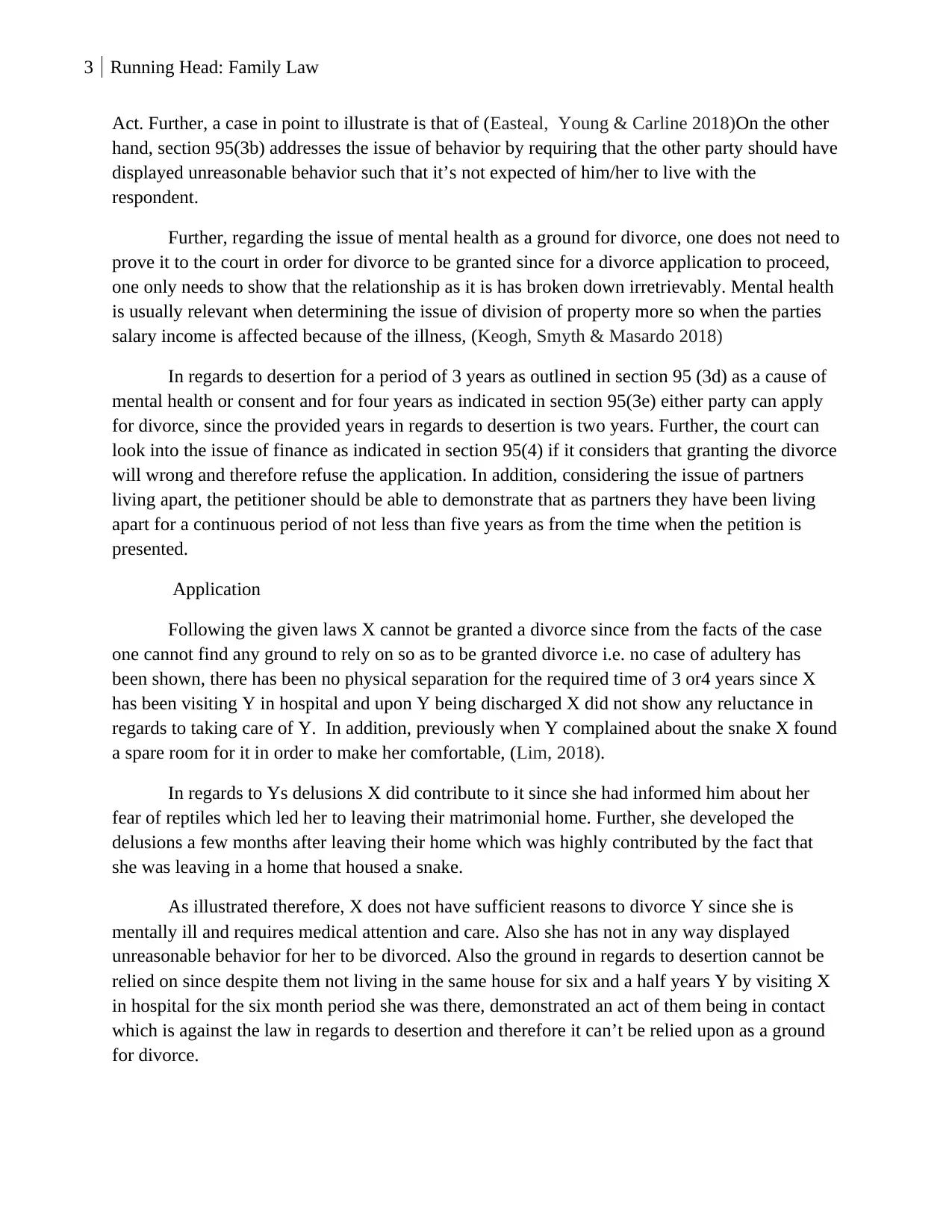
3 Running Head: Family Law
Act. Further, a case in point to illustrate is that of (Easteal, Young & Carline 2018)On the other
hand, section 95(3b) addresses the issue of behavior by requiring that the other party should have
displayed unreasonable behavior such that it’s not expected of him/her to live with the
respondent.
Further, regarding the issue of mental health as a ground for divorce, one does not need to
prove it to the court in order for divorce to be granted since for a divorce application to proceed,
one only needs to show that the relationship as it is has broken down irretrievably. Mental health
is usually relevant when determining the issue of division of property more so when the parties
salary income is affected because of the illness, (Keogh, Smyth & Masardo 2018)
In regards to desertion for a period of 3 years as outlined in section 95 (3d) as a cause of
mental health or consent and for four years as indicated in section 95(3e) either party can apply
for divorce, since the provided years in regards to desertion is two years. Further, the court can
look into the issue of finance as indicated in section 95(4) if it considers that granting the divorce
will wrong and therefore refuse the application. In addition, considering the issue of partners
living apart, the petitioner should be able to demonstrate that as partners they have been living
apart for a continuous period of not less than five years as from the time when the petition is
presented.
Application
Following the given laws X cannot be granted a divorce since from the facts of the case
one cannot find any ground to rely on so as to be granted divorce i.e. no case of adultery has
been shown, there has been no physical separation for the required time of 3 or4 years since X
has been visiting Y in hospital and upon Y being discharged X did not show any reluctance in
regards to taking care of Y. In addition, previously when Y complained about the snake X found
a spare room for it in order to make her comfortable, (Lim, 2018).
In regards to Ys delusions X did contribute to it since she had informed him about her
fear of reptiles which led her to leaving their matrimonial home. Further, she developed the
delusions a few months after leaving their home which was highly contributed by the fact that
she was leaving in a home that housed a snake.
As illustrated therefore, X does not have sufficient reasons to divorce Y since she is
mentally ill and requires medical attention and care. Also she has not in any way displayed
unreasonable behavior for her to be divorced. Also the ground in regards to desertion cannot be
relied on since despite them not living in the same house for six and a half years Y by visiting X
in hospital for the six month period she was there, demonstrated an act of them being in contact
which is against the law in regards to desertion and therefore it can’t be relied upon as a ground
for divorce.
Act. Further, a case in point to illustrate is that of (Easteal, Young & Carline 2018)On the other
hand, section 95(3b) addresses the issue of behavior by requiring that the other party should have
displayed unreasonable behavior such that it’s not expected of him/her to live with the
respondent.
Further, regarding the issue of mental health as a ground for divorce, one does not need to
prove it to the court in order for divorce to be granted since for a divorce application to proceed,
one only needs to show that the relationship as it is has broken down irretrievably. Mental health
is usually relevant when determining the issue of division of property more so when the parties
salary income is affected because of the illness, (Keogh, Smyth & Masardo 2018)
In regards to desertion for a period of 3 years as outlined in section 95 (3d) as a cause of
mental health or consent and for four years as indicated in section 95(3e) either party can apply
for divorce, since the provided years in regards to desertion is two years. Further, the court can
look into the issue of finance as indicated in section 95(4) if it considers that granting the divorce
will wrong and therefore refuse the application. In addition, considering the issue of partners
living apart, the petitioner should be able to demonstrate that as partners they have been living
apart for a continuous period of not less than five years as from the time when the petition is
presented.
Application
Following the given laws X cannot be granted a divorce since from the facts of the case
one cannot find any ground to rely on so as to be granted divorce i.e. no case of adultery has
been shown, there has been no physical separation for the required time of 3 or4 years since X
has been visiting Y in hospital and upon Y being discharged X did not show any reluctance in
regards to taking care of Y. In addition, previously when Y complained about the snake X found
a spare room for it in order to make her comfortable, (Lim, 2018).
In regards to Ys delusions X did contribute to it since she had informed him about her
fear of reptiles which led her to leaving their matrimonial home. Further, she developed the
delusions a few months after leaving their home which was highly contributed by the fact that
she was leaving in a home that housed a snake.
As illustrated therefore, X does not have sufficient reasons to divorce Y since she is
mentally ill and requires medical attention and care. Also she has not in any way displayed
unreasonable behavior for her to be divorced. Also the ground in regards to desertion cannot be
relied on since despite them not living in the same house for six and a half years Y by visiting X
in hospital for the six month period she was there, demonstrated an act of them being in contact
which is against the law in regards to desertion and therefore it can’t be relied upon as a ground
for divorce.
⊘ This is a preview!⊘
Do you want full access?
Subscribe today to unlock all pages.

Trusted by 1+ million students worldwide
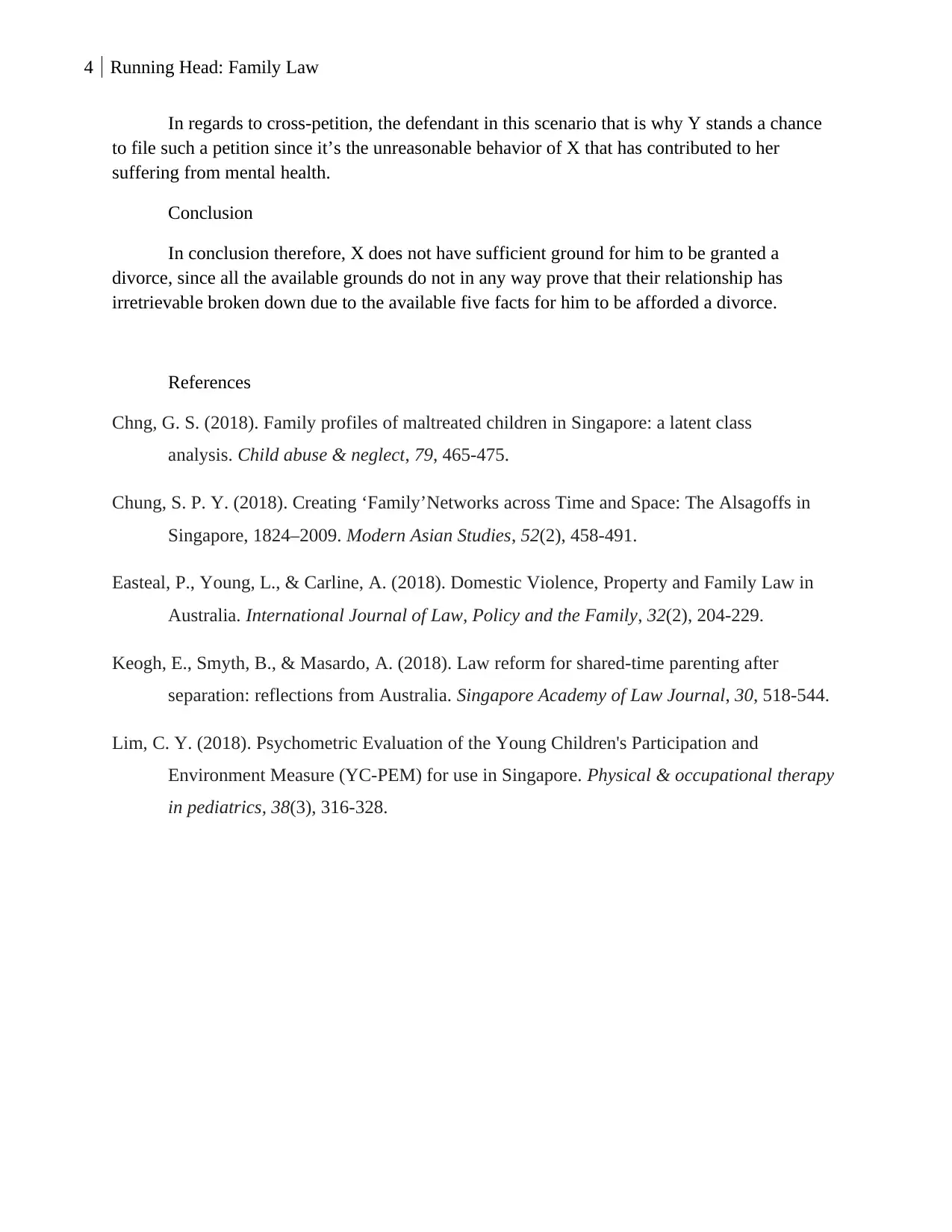
4 Running Head: Family Law
In regards to cross-petition, the defendant in this scenario that is why Y stands a chance
to file such a petition since it’s the unreasonable behavior of X that has contributed to her
suffering from mental health.
Conclusion
In conclusion therefore, X does not have sufficient ground for him to be granted a
divorce, since all the available grounds do not in any way prove that their relationship has
irretrievable broken down due to the available five facts for him to be afforded a divorce.
References
Chng, G. S. (2018). Family profiles of maltreated children in Singapore: a latent class
analysis. Child abuse & neglect, 79, 465-475.
Chung, S. P. Y. (2018). Creating ‘Family’Networks across Time and Space: The Alsagoffs in
Singapore, 1824–2009. Modern Asian Studies, 52(2), 458-491.
Easteal, P., Young, L., & Carline, A. (2018). Domestic Violence, Property and Family Law in
Australia. International Journal of Law, Policy and the Family, 32(2), 204-229.
Keogh, E., Smyth, B., & Masardo, A. (2018). Law reform for shared-time parenting after
separation: reflections from Australia. Singapore Academy of Law Journal, 30, 518-544.
Lim, C. Y. (2018). Psychometric Evaluation of the Young Children's Participation and
Environment Measure (YC-PEM) for use in Singapore. Physical & occupational therapy
in pediatrics, 38(3), 316-328.
In regards to cross-petition, the defendant in this scenario that is why Y stands a chance
to file such a petition since it’s the unreasonable behavior of X that has contributed to her
suffering from mental health.
Conclusion
In conclusion therefore, X does not have sufficient ground for him to be granted a
divorce, since all the available grounds do not in any way prove that their relationship has
irretrievable broken down due to the available five facts for him to be afforded a divorce.
References
Chng, G. S. (2018). Family profiles of maltreated children in Singapore: a latent class
analysis. Child abuse & neglect, 79, 465-475.
Chung, S. P. Y. (2018). Creating ‘Family’Networks across Time and Space: The Alsagoffs in
Singapore, 1824–2009. Modern Asian Studies, 52(2), 458-491.
Easteal, P., Young, L., & Carline, A. (2018). Domestic Violence, Property and Family Law in
Australia. International Journal of Law, Policy and the Family, 32(2), 204-229.
Keogh, E., Smyth, B., & Masardo, A. (2018). Law reform for shared-time parenting after
separation: reflections from Australia. Singapore Academy of Law Journal, 30, 518-544.
Lim, C. Y. (2018). Psychometric Evaluation of the Young Children's Participation and
Environment Measure (YC-PEM) for use in Singapore. Physical & occupational therapy
in pediatrics, 38(3), 316-328.
Paraphrase This Document
Need a fresh take? Get an instant paraphrase of this document with our AI Paraphraser
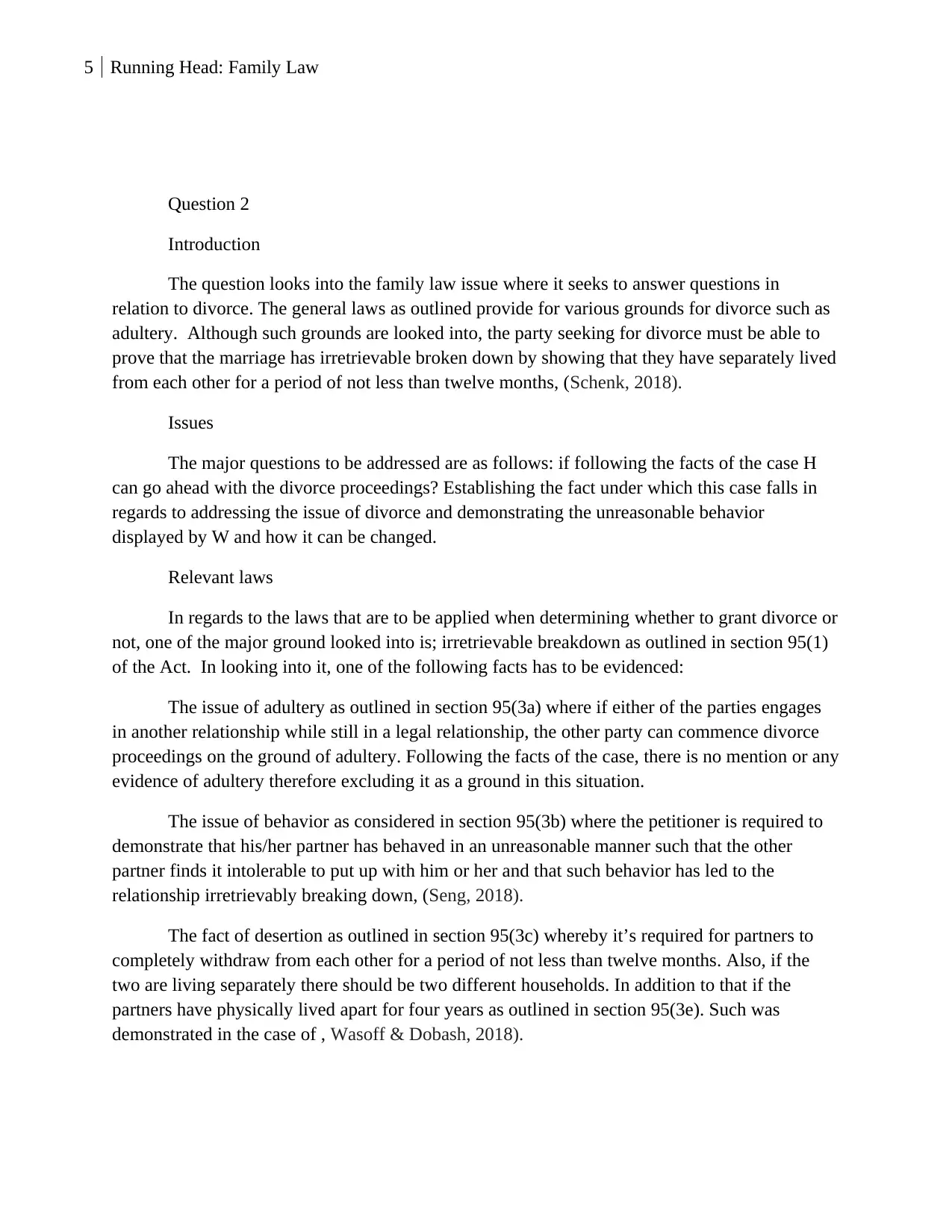
5 Running Head: Family Law
Question 2
Introduction
The question looks into the family law issue where it seeks to answer questions in
relation to divorce. The general laws as outlined provide for various grounds for divorce such as
adultery. Although such grounds are looked into, the party seeking for divorce must be able to
prove that the marriage has irretrievable broken down by showing that they have separately lived
from each other for a period of not less than twelve months, (Schenk, 2018).
Issues
The major questions to be addressed are as follows: if following the facts of the case H
can go ahead with the divorce proceedings? Establishing the fact under which this case falls in
regards to addressing the issue of divorce and demonstrating the unreasonable behavior
displayed by W and how it can be changed.
Relevant laws
In regards to the laws that are to be applied when determining whether to grant divorce or
not, one of the major ground looked into is; irretrievable breakdown as outlined in section 95(1)
of the Act. In looking into it, one of the following facts has to be evidenced:
The issue of adultery as outlined in section 95(3a) where if either of the parties engages
in another relationship while still in a legal relationship, the other party can commence divorce
proceedings on the ground of adultery. Following the facts of the case, there is no mention or any
evidence of adultery therefore excluding it as a ground in this situation.
The issue of behavior as considered in section 95(3b) where the petitioner is required to
demonstrate that his/her partner has behaved in an unreasonable manner such that the other
partner finds it intolerable to put up with him or her and that such behavior has led to the
relationship irretrievably breaking down, (Seng, 2018).
The fact of desertion as outlined in section 95(3c) whereby it’s required for partners to
completely withdraw from each other for a period of not less than twelve months. Also, if the
two are living separately there should be two different households. In addition to that if the
partners have physically lived apart for four years as outlined in section 95(3e). Such was
demonstrated in the case of , Wasoff & Dobash, 2018).
Question 2
Introduction
The question looks into the family law issue where it seeks to answer questions in
relation to divorce. The general laws as outlined provide for various grounds for divorce such as
adultery. Although such grounds are looked into, the party seeking for divorce must be able to
prove that the marriage has irretrievable broken down by showing that they have separately lived
from each other for a period of not less than twelve months, (Schenk, 2018).
Issues
The major questions to be addressed are as follows: if following the facts of the case H
can go ahead with the divorce proceedings? Establishing the fact under which this case falls in
regards to addressing the issue of divorce and demonstrating the unreasonable behavior
displayed by W and how it can be changed.
Relevant laws
In regards to the laws that are to be applied when determining whether to grant divorce or
not, one of the major ground looked into is; irretrievable breakdown as outlined in section 95(1)
of the Act. In looking into it, one of the following facts has to be evidenced:
The issue of adultery as outlined in section 95(3a) where if either of the parties engages
in another relationship while still in a legal relationship, the other party can commence divorce
proceedings on the ground of adultery. Following the facts of the case, there is no mention or any
evidence of adultery therefore excluding it as a ground in this situation.
The issue of behavior as considered in section 95(3b) where the petitioner is required to
demonstrate that his/her partner has behaved in an unreasonable manner such that the other
partner finds it intolerable to put up with him or her and that such behavior has led to the
relationship irretrievably breaking down, (Seng, 2018).
The fact of desertion as outlined in section 95(3c) whereby it’s required for partners to
completely withdraw from each other for a period of not less than twelve months. Also, if the
two are living separately there should be two different households. In addition to that if the
partners have physically lived apart for four years as outlined in section 95(3e). Such was
demonstrated in the case of , Wasoff & Dobash, 2018).
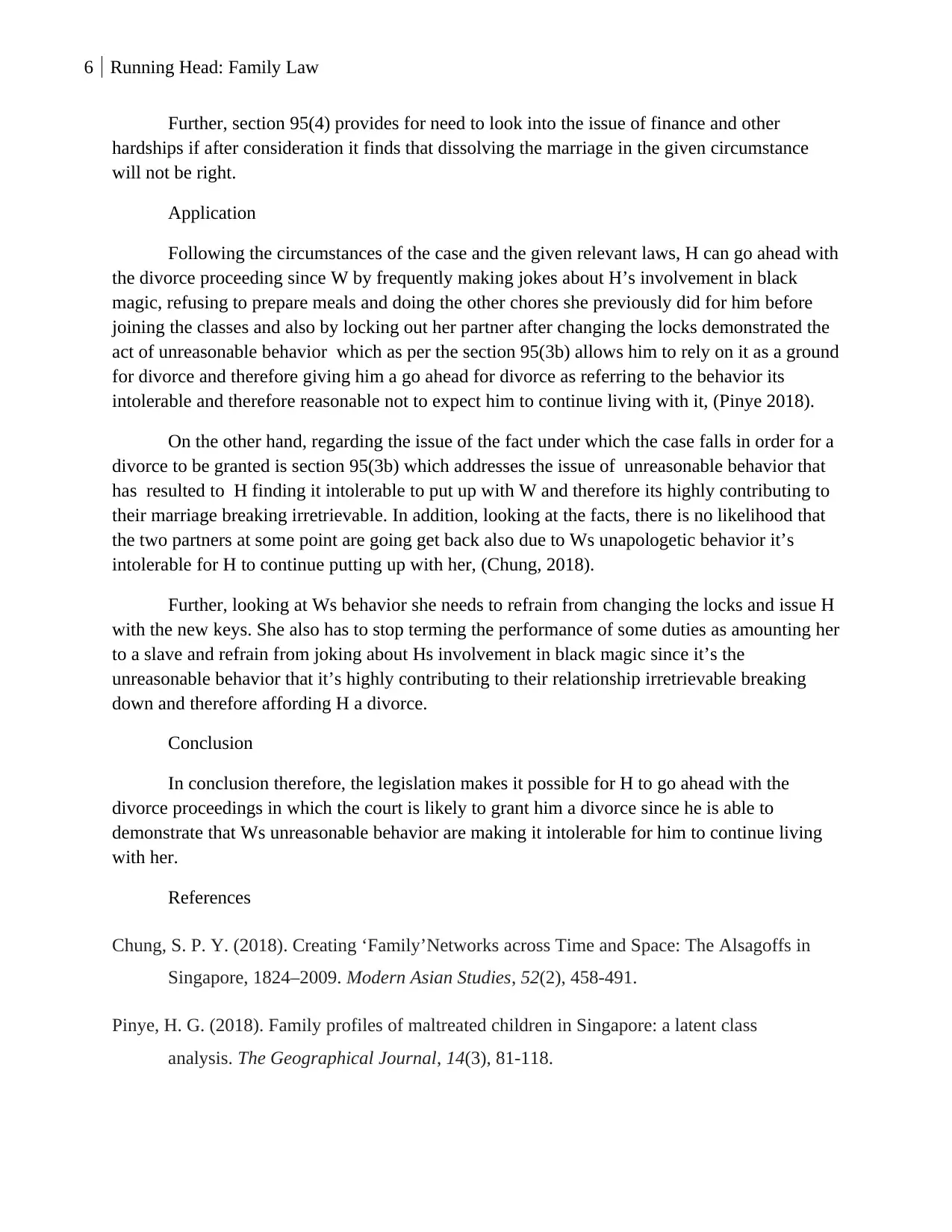
6 Running Head: Family Law
Further, section 95(4) provides for need to look into the issue of finance and other
hardships if after consideration it finds that dissolving the marriage in the given circumstance
will not be right.
Application
Following the circumstances of the case and the given relevant laws, H can go ahead with
the divorce proceeding since W by frequently making jokes about H’s involvement in black
magic, refusing to prepare meals and doing the other chores she previously did for him before
joining the classes and also by locking out her partner after changing the locks demonstrated the
act of unreasonable behavior which as per the section 95(3b) allows him to rely on it as a ground
for divorce and therefore giving him a go ahead for divorce as referring to the behavior its
intolerable and therefore reasonable not to expect him to continue living with it, (Pinye 2018).
On the other hand, regarding the issue of the fact under which the case falls in order for a
divorce to be granted is section 95(3b) which addresses the issue of unreasonable behavior that
has resulted to H finding it intolerable to put up with W and therefore its highly contributing to
their marriage breaking irretrievable. In addition, looking at the facts, there is no likelihood that
the two partners at some point are going get back also due to Ws unapologetic behavior it’s
intolerable for H to continue putting up with her, (Chung, 2018).
Further, looking at Ws behavior she needs to refrain from changing the locks and issue H
with the new keys. She also has to stop terming the performance of some duties as amounting her
to a slave and refrain from joking about Hs involvement in black magic since it’s the
unreasonable behavior that it’s highly contributing to their relationship irretrievable breaking
down and therefore affording H a divorce.
Conclusion
In conclusion therefore, the legislation makes it possible for H to go ahead with the
divorce proceedings in which the court is likely to grant him a divorce since he is able to
demonstrate that Ws unreasonable behavior are making it intolerable for him to continue living
with her.
References
Chung, S. P. Y. (2018). Creating ‘Family’Networks across Time and Space: The Alsagoffs in
Singapore, 1824–2009. Modern Asian Studies, 52(2), 458-491.
Pinye, H. G. (2018). Family profiles of maltreated children in Singapore: a latent class
analysis. The Geographical Journal, 14(3), 81-118.
Further, section 95(4) provides for need to look into the issue of finance and other
hardships if after consideration it finds that dissolving the marriage in the given circumstance
will not be right.
Application
Following the circumstances of the case and the given relevant laws, H can go ahead with
the divorce proceeding since W by frequently making jokes about H’s involvement in black
magic, refusing to prepare meals and doing the other chores she previously did for him before
joining the classes and also by locking out her partner after changing the locks demonstrated the
act of unreasonable behavior which as per the section 95(3b) allows him to rely on it as a ground
for divorce and therefore giving him a go ahead for divorce as referring to the behavior its
intolerable and therefore reasonable not to expect him to continue living with it, (Pinye 2018).
On the other hand, regarding the issue of the fact under which the case falls in order for a
divorce to be granted is section 95(3b) which addresses the issue of unreasonable behavior that
has resulted to H finding it intolerable to put up with W and therefore its highly contributing to
their marriage breaking irretrievable. In addition, looking at the facts, there is no likelihood that
the two partners at some point are going get back also due to Ws unapologetic behavior it’s
intolerable for H to continue putting up with her, (Chung, 2018).
Further, looking at Ws behavior she needs to refrain from changing the locks and issue H
with the new keys. She also has to stop terming the performance of some duties as amounting her
to a slave and refrain from joking about Hs involvement in black magic since it’s the
unreasonable behavior that it’s highly contributing to their relationship irretrievable breaking
down and therefore affording H a divorce.
Conclusion
In conclusion therefore, the legislation makes it possible for H to go ahead with the
divorce proceedings in which the court is likely to grant him a divorce since he is able to
demonstrate that Ws unreasonable behavior are making it intolerable for him to continue living
with her.
References
Chung, S. P. Y. (2018). Creating ‘Family’Networks across Time and Space: The Alsagoffs in
Singapore, 1824–2009. Modern Asian Studies, 52(2), 458-491.
Pinye, H. G. (2018). Family profiles of maltreated children in Singapore: a latent class
analysis. The Geographical Journal, 14(3), 81-118.
⊘ This is a preview!⊘
Do you want full access?
Subscribe today to unlock all pages.

Trusted by 1+ million students worldwide
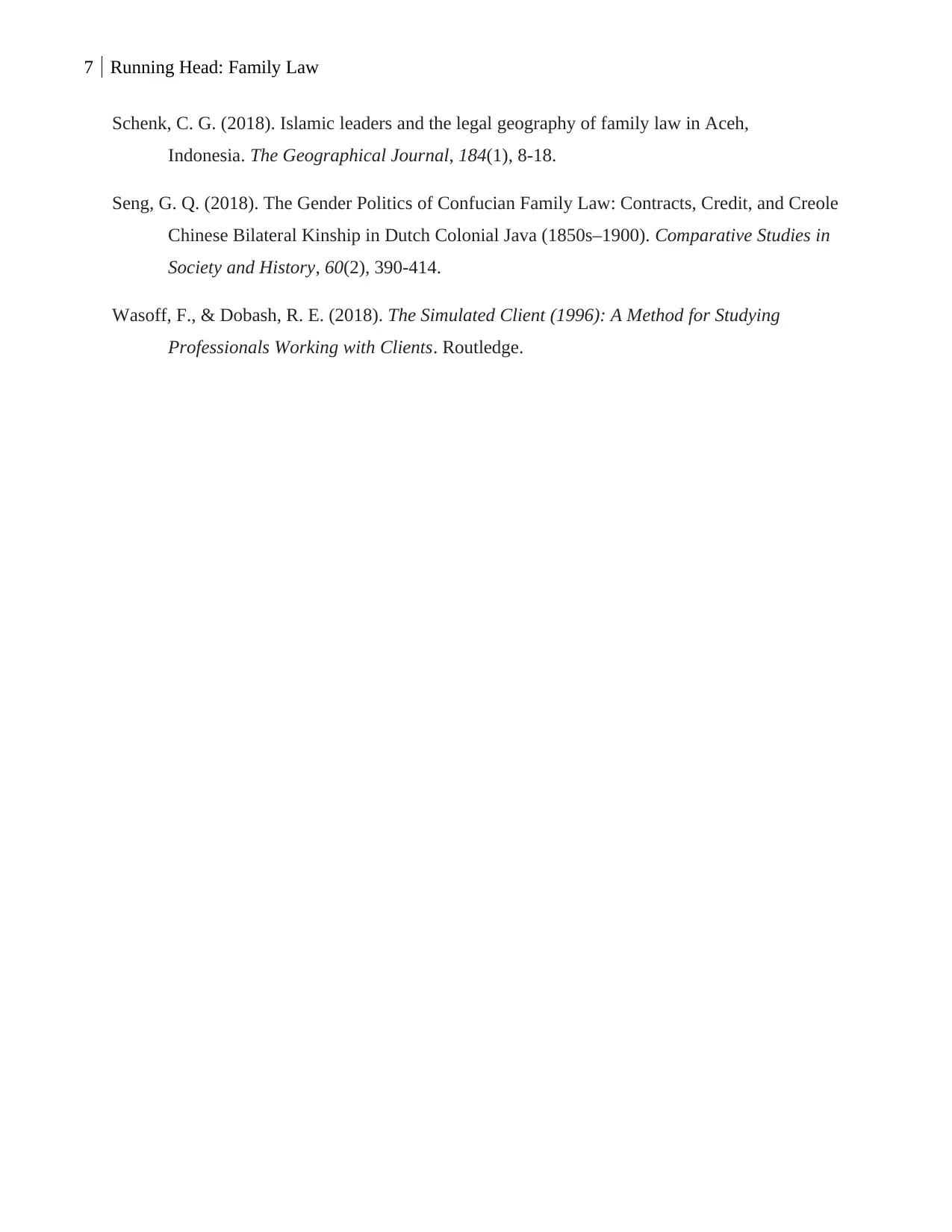
7 Running Head: Family Law
Schenk, C. G. (2018). Islamic leaders and the legal geography of family law in Aceh,
Indonesia. The Geographical Journal, 184(1), 8-18.
Seng, G. Q. (2018). The Gender Politics of Confucian Family Law: Contracts, Credit, and Creole
Chinese Bilateral Kinship in Dutch Colonial Java (1850s–1900). Comparative Studies in
Society and History, 60(2), 390-414.
Wasoff, F., & Dobash, R. E. (2018). The Simulated Client (1996): A Method for Studying
Professionals Working with Clients. Routledge.
Schenk, C. G. (2018). Islamic leaders and the legal geography of family law in Aceh,
Indonesia. The Geographical Journal, 184(1), 8-18.
Seng, G. Q. (2018). The Gender Politics of Confucian Family Law: Contracts, Credit, and Creole
Chinese Bilateral Kinship in Dutch Colonial Java (1850s–1900). Comparative Studies in
Society and History, 60(2), 390-414.
Wasoff, F., & Dobash, R. E. (2018). The Simulated Client (1996): A Method for Studying
Professionals Working with Clients. Routledge.
Paraphrase This Document
Need a fresh take? Get an instant paraphrase of this document with our AI Paraphraser

8 Running Head: Family Law
1 out of 8
Related Documents
Your All-in-One AI-Powered Toolkit for Academic Success.
+13062052269
info@desklib.com
Available 24*7 on WhatsApp / Email
![[object Object]](/_next/static/media/star-bottom.7253800d.svg)
Unlock your academic potential
Copyright © 2020–2026 A2Z Services. All Rights Reserved. Developed and managed by ZUCOL.




